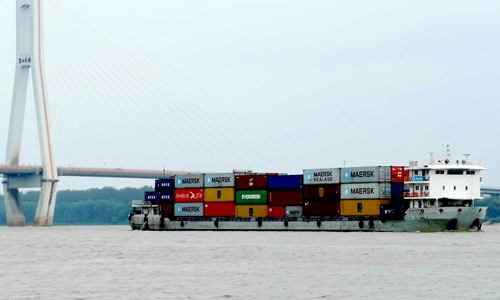China raises opening-up level to foreign investment amid challenges
By Tu Lei Source:Global Times Published: 2020/5/22 20:08:40

Cargo ships pass through the Wuhan Junshan Yangtze River Bridge, Central China's Hubei Province. Wuhan, which was hard hit by COVID-19, started lifting outbound travel restrictions after almost 11 weeks of lockdown. China's Ministry of Commerce said about 76 percent of domestic key foreign trade companies had resumed work using over 70 percent of capacity. Photo: IC
China will raise the opening-up policy level and stabilize foreign trade amid rising challenges, according to a government work report submitted to the national legislature for deliberation on Friday.
China will significantly shorten its negative list for foreign investment, further stabilize foreign trade, leverage the role of foreign capital, and create an impartial and fair market environment for domestic and foreign companies, said Premier Li Keqiang at the opening of the third session of the 13th National People's Congress (NPC).
Li said China will increase credit supply, expand export credit insurance coverage, reduce import and export compliance costs, and support export products for domestic sales.
Li added that the government will give the free trade zones more power, speed up construction of the Hainan free trade port, and test more pilot zones in central and western regions.
"The guideline on foreign trade in the work report is very detailed but decisive," Liang Ming, a research fellow of the Chinese Academy of International Trade and Economic Cooperation under the Ministry of Commerce (MOFCOM), told the Global Times on Friday.
He said those mentioned in the report have a very clear map on the plan, and it also shows the government cares about how to shift exports to domestic demand, which is also a priority in the work report.
The government's vow to shorten the negative list this year shows our determination on opening-up, Bai Ming, a research fellow at the Chinese Academy of International Trade and Economic Cooperation, told the Global Times on Friday, adding that each policy is in response with domestic demand.
The country is widening opening-up to foreign investments. The negative list for foreign investment is being revised as part of the plan to shorten it and expand the catalog of industries where foreign investments are encouraged.
Experts said the next opening-up area will be more detailed, such as health care, agricultural sectors, and the services industry.
The impartial and fair market environment for domestic and foreign companies will not only help China achieve its development goals, but also provide vast opportunities for companies from all countries to cooperate in China, and promote in-depth development of multilateral and bilateral cooperation, Fabrice Megarbane, president and CEO of L'Oreal China, told the Global Times. "Our confidence in the Chinese market has never been stronger," he added.
China's foreign trade is still under considerable downward pressure despite improvements in the April trade data, the country's commerce ministry said earlier this month.
China's foreign trade of goods inched down 0.7 percent year on year in April to 2.5 trillion yuan ($352.6 billion), narrowing from a drop of 6.4 percent in the first quarter, with exports rising 8.2 percent from the same period last year, the customs data showed.
Companies dedicated to foreign trade are facing many difficulties, including order cancellations or delays, difficulty in signing new orders, and poor logistics, said Gao Feng from the commerce ministry, citing surveys of domestic chambers of commerce and enterprises.
Despite the epidemic's impact on foreign enterprises in China, there have been no large-scale foreign capital withdrawals from China, Zhang Yesui, spokesperson for the third session of the 13th NPC said, adding that China's comprehensive advantage in using foreign capital has not changed, and foreign companies' confidence in long-term business development in China has not changed.
While there has been talk of less reliance on China as a key supplier and manufacturing base, Edmund Yang, a Pricewaterhouse Coopers partner in Beijing, said in a note to the Global Times that any change will not have a significant impact in the foreseeable future because China is the well-established "world factory," and arranging supply alternatives is not easy for companies in the automotive and pharmaceutical industries.
Liang said as the epidemic is under control in China, foreign firms in China could benefit from the system advantages to make their products serve the world.
Posted in: INDUSTRIES,ECONOMY,BIZ FOCUS